Endodontic specialist, Dr. Ryan Duval, looks at challenging cases as great puzzles that are worth solving.
Attention to detail and compassion in practice
What can you tell us about your background?
I was raised in a suburb of Seattle, Washington. I was greatly influenced by my mom and her career as a hygienist for 43 years. During that time, I was exposed to two dentists, Jeffrey Parrish, DDS, and Brian McKay, DDS, and their teams that showed me how to take great care of people and how dentistry can make a positive impact in people’s lives. I earned my dental degree at the University of Pittsburgh and practiced as a general dentist in central Washington with an amazing dentist and great friend. I earned my Endodontic Certificate and Master’s Degree at Case Western Reserve in Cleveland, Ohio, where I was Chief Resident and worked alongside some great residents and was mentored by dedicated faculty and an outstanding director.

When did you become a specialist, and why?
I received my Endodontic Certificate and Master’s Degree in 2010 from Case Western Reserve School of Dental Medicine in Cleveland, Ohio. During dental school, I enjoyed treating the relatively straightforward cases that we were permitted to complete as an undergrad and was drawn to the challenge of the intricate cases that the Grad Endo residents were assigned. After dental school, I was fortunate to practice as a GP in Central Washington with a fantastic dentist and person, Michael Cole, DDS. During our time together, I learned what great dentistry looked like and how to take amazing care of people. As a GP, I always looked forward to every endodontic treatment in my schedule and quickly realized that becoming an endodontist was my professional goal. I knew my private practice experience was important, and I wanted to become the most attractive Grad Endo candidate possible. I participated in research projects, and I purchased a dental operating microscope and used it for everything from root canal therapy to crown preps and restorative procedures. Having the experience of treating so many different types of cases under the microscope made my transition to using the scope for all treatments in residency much easier and more successful. I have always been drawn to a challenge, and I love the task of managing our patients through all of aspects of endodontic therapy.
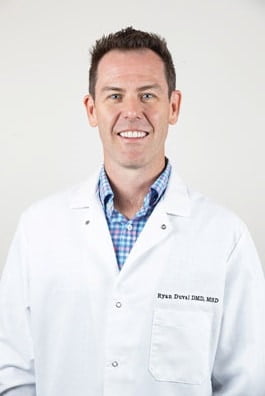
Is your practice limited solely to endodontics, or do you practice other types of dentistry?
Our practice is limited to nonsurgical endodontic therapy, retreatment, and surgical endodontic treatment. We have a four-operatory practice in a medical/professional building located in North Scottsdale. We currently have three staff members and are open 5 days a week. Our location is very “freeway-friendly,” and we see patients from all over Maricopa County. We designed and built our office from the ground up. Construction took longer than anticipated due to the pandemic, but we have been happily seeing patients since early October.
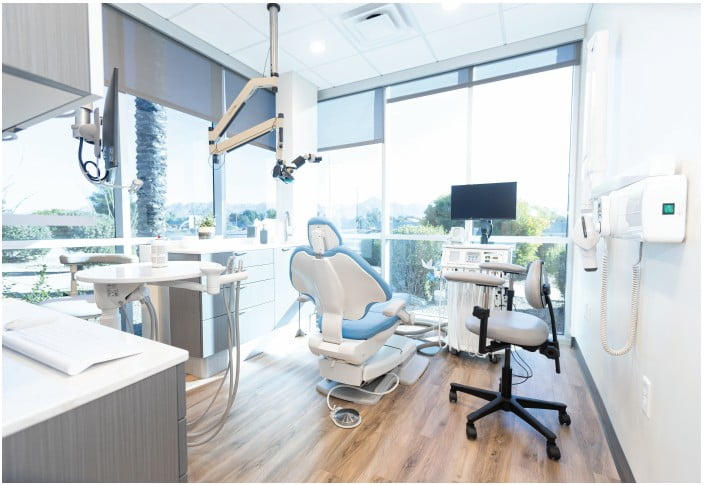
Why did you decide to focus on endodontics?
While I enjoyed the variety of general dentistry, I learned that I was happiest and most engaged while performing endodontic procedures (both diagnostic and treatment). As my career progressed, I found that the diagnostic challenge, which many patients presented with, was a great puzzle that was worth solving.
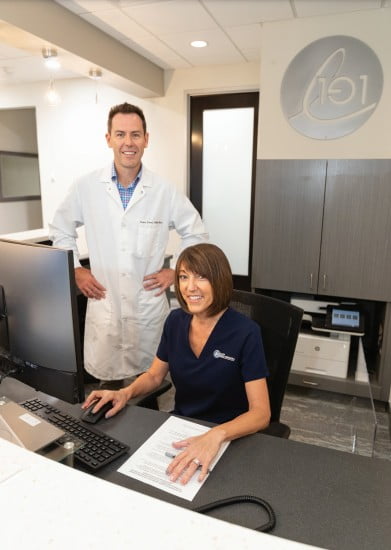
Do your patients come through referrals?
We are a referral-based practice. We rely on referrals from general dentists and past patients. This referral is something that we have to earn every day with each patient we treat. Scottsdale is a very competitive market, and we chose to establish our practice there. I understand the importance of building our reputation every single time someone walks in our door and believe that over time we will build a reputation of honesty and quality endodontic treatment.
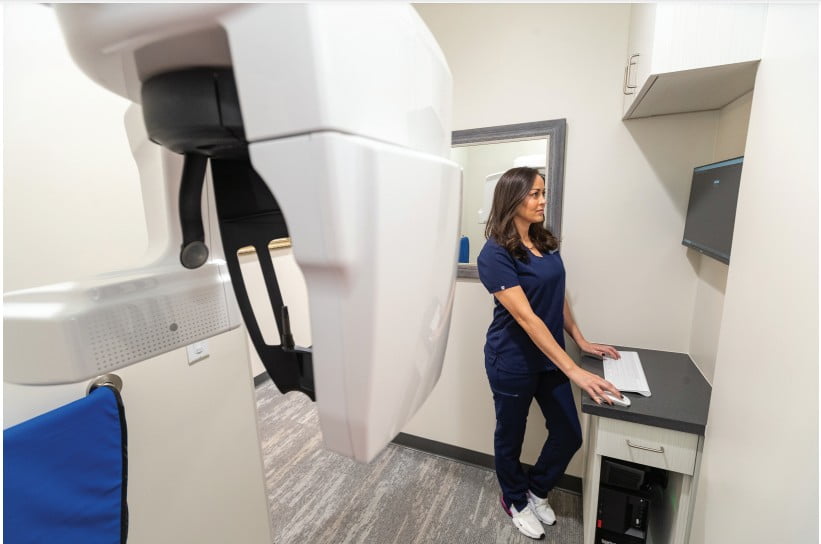
How long have you been practicing endodontics, and what systems do you use?
I have been in private practice for 16 years and an endodontist for 11 years. I use a large array of rotary systems and ultrasonically activate all irrigants during the cleaning/shaping process. I am evaluating all available options for additional irrigation delivery and irrigant activation devices.

What training have you undertaken?
Before I became a dentist, I participated in a medical and dental mission trip to the Dominican Republic. It was an amazing experience to be a part of a humanitarian team that helped so many people and to have the memories of the lives that we touched.
I earned my Diplomate status in 2017 when I became Board-certified.

Who has inspired you?
I was inspired by some great general dentists and two endodontists. Drs. Willis Gabel and Dan Radatti were very instrumental in developing my clinical skills and diagnostic abilities. They both taught me a lot about how to successfully build and interact with a referral base and how to run a successful endodontic practice. I will always be grateful for the opportunity my program director, Dr. Andre Mickel, gave me at Case Western Reserve; I find myself using his teachings every day.
What is the most satisfying aspect of your practice?
From the time I was accepted into endodontics, I envisioned having a practice of my own. I knew the kind of culture I wanted to create in the office, and how I wanted the patient experience to look and feel from start to finish. Being able to integrate these things from the ground up over the last year has been the realization of that vision.
Professionally, what are you most proud of?
Becoming Board-certified was a source of great pride. Balancing private practice, quality family time, and commitment to the work/study required to feel prepared (nearly 8 years after residency) and confident was a great accomplishment.
What do you think is unique about your practice?
Our practice is driven by the acronym ACE. ACE stands for Attention to detail, Compassionate care, and Exceptional endodontics. From the initial referral to following up with the patient a few weeks after treatment, there are so many details that need to be not only be investigated, but also must be a continual focus. Every case and patient are uniquely different in what the patient desires and how he/she navigates pain. Our role as providers is to make patients as comfortable as possible and allow each patient to feel heard and valued and address his/her concerns to the best of our ability.
What has been your biggest challenge?
Deciding to take the leap of faith and open my own practice has been my biggest challenge as an endodontist. As an associate, it’s not uncommon to become very comfortable and accept or overlook things that you wouldn’t necessarily want if you were the business owner. At the end of the day, I always struggled with this because even though it wasn’t my practice, it was my reputation and my name on the door also. Moving to a new state and opening a practice during the pandemic has definitely brought about its own set of challenges, but I know it was the right move for my professional development. Being able to execute my vision for how we treat people has been a welcome challenge, and I look forward to it each day.
What would you have been if you didn’t become a dentist?
Dermatology was interesting to me. Also, I always dreamed of being a naval aviator; carrier landings seem like an awesome challenge.
What are your top tips for maintaining a successful specialty practice?
From day one, we had a very clear vision for the practice. I had enough experience to understand what I wanted every facet to look like, and I had a few key role models that I could continually reach out to when I needed them. Having practiced in other offices for over 15 years, I also understood the importance of hiring people who could not only understand the vision, but also would buy into it and help bring it to life. I am a firm believer in finding the right people who already possess the values and mindset that fit our culture.
What advice would you give to a budding endodontist?
Just because your dream doesn’t happen in the timing you think it should, don’t abandon it altogether. Over a decade ago, I came to Scottsdale to look at starting my career here. It didn’t work out at that time for many reasons. I considered staying an associate in the Northwest and tried to convince myself that having my own practice wasn’t important anymore. Looking back, the past 11 years gave me the experience, the knowledge, and the courage to continue to chase my dream. I have had a few people tell me that I am little “late to the party” to start up my own practice, but I know the winding path I took to get here forged a large amount of our current success in Scottsdale.
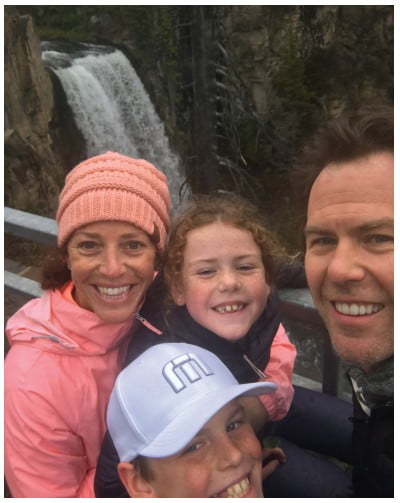
What are your hobbies, and what do you do in your spare time?
My wife and I have two children, so much of my spare time is spent with my family. We all love to be outdoors and spend a lot of time playing in the pool and being together. I am an avid golfer and love to ability to play year-round here in Arizona.
Endodontic specialists can grow their practices in many ways. Read some tips by Dr. Garth Hatch here: https://endopracticeus.com/seven-keys-growing-endodontic-practice-todays-market/
Stay Relevant With Endodontic Practice US
Join our email list for CE courses and webinars, articles and more..


